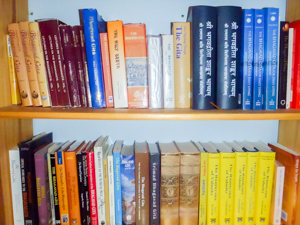Q: Undaunted by my belief that meditation to find the self (soul) is difficult, I would like to try, but there are no teachers in my area. Therefore, in the first instance, I would really appreciate your advice regarding a book to follow for this type of meditation that is suitable for a beginner.
A: The purpose of meditation is to help gain control of the mind and senses so that you can cultivate dispassion and discrimination and still the mind when listening to the teacher.
Meditation cannot enable you to ‘find the self’. You are already the Self – you just have not realized this. What has to happen is for the mind to receive knowledge about the Self, clear any misunderstandings, resolve any doubts etc. Ideally, you need a qualified teacher for this – someone who knows the truth and is able to convey the relevant steps (via story, metaphor etc.) to help someone else come to the same understanding.
As an introduction to Advaita, there are three books I would recommend:
1. ‘Introduction to Vedanta’ by K. Sadananda – see https://www.advaita-vision.org/vedanta-introduction-sadananda/;
2. ‘Book of One’ (2nd edition) by myself – http://www.advaita.org.uk/discourses/thebook/thebook.htm;
3. ‘VEDĀNTA the solution to our fundamental problem’ by D. Venugopal (This is serialized at the website (https://www.advaita-vision.org/vedanta-the-solution-part-1/).

 Many books (transcription of talks) by Swami Paramarthananda are available at www.arshaavinash.in. This includes a number of Upanishads (Mundaka, Mandukya, Brihadaranyaka, Kena and more), Bhagavad Gita, Brahmasutra with Shankara bhAshya and many other key scriptures such as upadesha sAhasrI, vivekachUDAmaNi, dRRig dRRiShya viveka etc. These cannot be recommended too highly.There are also books on Sanskrit grammar and a biography of Pujya Swami Dayananda.
Many books (transcription of talks) by Swami Paramarthananda are available at www.arshaavinash.in. This includes a number of Upanishads (Mundaka, Mandukya, Brihadaranyaka, Kena and more), Bhagavad Gita, Brahmasutra with Shankara bhAshya and many other key scriptures such as upadesha sAhasrI, vivekachUDAmaNi, dRRig dRRiShya viveka etc. These cannot be recommended too highly.There are also books on Sanskrit grammar and a biography of Pujya Swami Dayananda.